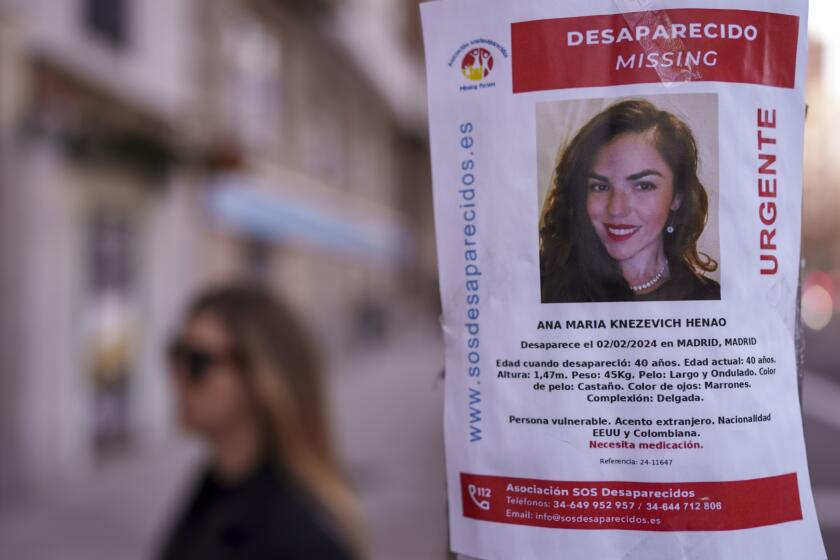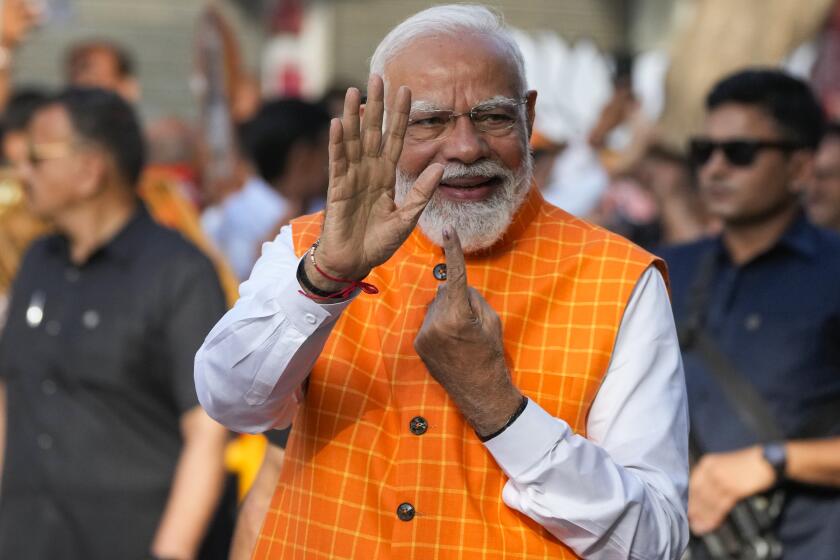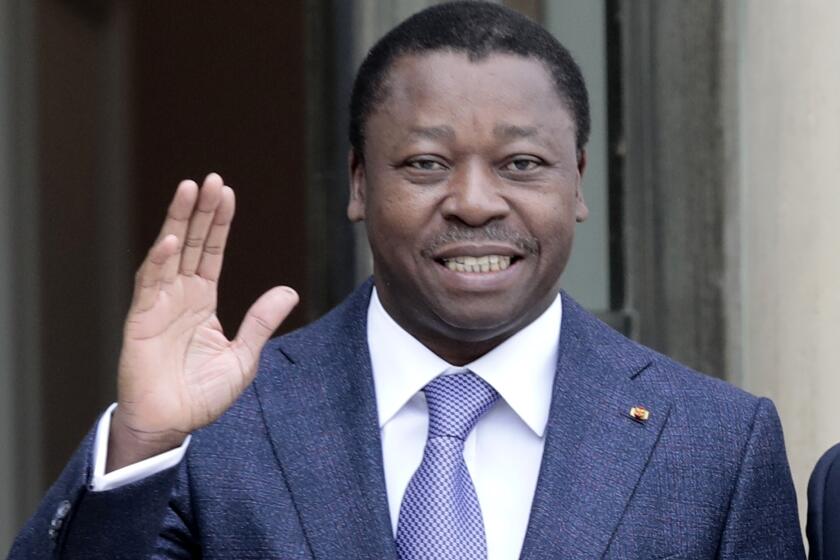Demjanjuk Trial Turns to Pivotal Issue: Was ID Card a Soviet Forgery?
The war crimes trial of former Cleveland auto worker John Demjanjuk will enter a pivotal phase when it resumes Tuesday after a Passover recess, with argument focusing on the authenticity of a one-of-a-kind document that the defense calls the most important in the case.
The document is an identification card that the prosecution cites as proof that Demjanjuk, then a prisoner of war, was specially trained at a facility called Trawniki to work in the Nazi German death camps where about 6 million European Jews were killed.
Specifically, the state contends that Demjanjuk went on from Trawniki to the Treblinka death camp, where as a gas-chamber technician he earned the nickname “Ivan the Terrible.”
Captured by Germans
The defense acknowledges that the Ukrainian-born Demjanjuk was taken prisoner by the Germans on the Russian front but contends that he was never at either Treblinka or the Trawniki training camp and that he is a victim of mistaken identity.
The Trawniki card bearing his photograph, the defense contends, is a Soviet forgery intended to discredit Demjanjuk and other anti-Communist Ukrainians who fled in the wake of World War II and settled in North America.
“If the card is proved a forgery, then the prosecution is in big trouble,” said Yossi Hassin, a special spokesman for judicial authorities who is on loan from his regular job at the Israeli Foreign Ministry.
On the other hand, Hassin said in an interview, if the card is proved to be authentic, it will mean that Demjanjuk lied about his whereabouts in 1942 and 1943. This would add a crucial though circumstantial link to the case against him.
Obtained From Soviets
The card is said to have been among documents confiscated by Soviet troops in Poland toward the end of World War II. It was obtained from Soviet authorities last year by the American industrialist Armand Hammer, whose help in the matter had been requested by Israeli authorities. It was turned over to Hammer, with a request that it be returned, and delivered to Israeli Foreign Minister Shimon Peres last December.
Vital to the question of the Trawniki card’s authenticity is a series of scientific tests conducted by American experts. The prosecution insisted that earlier tests proved the card to be genuine, but the three-judge panel hearing the case permitted the defense to order more extensive tests. The prosecution then decided to sponsor new tests, as well.
The U.S. experts took 42 samples of paper, photograph, glue, ink and print from the card for examination in their laboratories. The results of the tests are expected next week, but an attorney involved in the case said they may not be introduced in evidence until the following week because of previously scheduled witnesses.
Lost U.S. Citizenship
Demjanjuk was stripped of his U.S. citizenship in 1981 for lying on his application for immigration. He was extradited to Israel on Feb. 28, 1986, and became the second person to be tried here for alleged war crimes. The first was Adolf Eichmann, who was abducted from Argentina by Israeli agents in 1960 and brought here for trial. He was convicted and hanged.
In 31 trial days over the last eight weeks, the prosecution has produced five Treblinka survivors to testify against Demjanjuk. All had previously identified him from photographs as “Ivan the Terrible,” and four of the five pointed him out in the courtroom.
The prosecution has also called police investigators, including a Russian-speaking police agent who befriended Demjanjuk in jail here and tried to lure him into making self-incriminating remarks.
Raises Doubts
In cross-examination, the defense has concentrated on raising doubts about the memories and psychological condition of the survivors more than 40 years after their experience at Treblinka. It has also tried to suggest that the techniques used by police investigators in securing photographic identifications of Demjanjuk do not stand up to legal standards of impartiality.
The last two prosecution witnesses were both experts on Trawniki: Helge Grabitz, head of the Nazi war crimes section in the Hamburg district attorney’s office, and Wolfgang Scheffler, a documents specialist and Holocaust expert from the Free University of Berlin.
They described Trawniki as a training camp where about 4,000 specially selected Soviet prisoners of war were instructed in death camp duties.
Both prosecution and defense appeared to score points during the 10 trial days that were devoted almost entirely to the two Trawniki witnesses.
Has Seen No Forgeries
Scheffler, for example, said that in 25 years of dealing with East Bloc-supplied Nazi documents, he had not run into a single case of forgery.
Regarding defense statements that misspellings and other errors on the Trawniki card bearing Demjanjuk’s photo prove it false, the prosecution elicited testimony suggesting that such mistakes were common on Trawniki documents.
On the other hand, both Grabitz and Scheffler admitted under cross-examination that they have never, in all their years of war crimes work, seen another identification card like the disputed document in this case. Both also conceded that they had never in their research of Trawniki come across any other document with John Demjanjuk’s name on it.
Nevertheless, Scheffler insisted that the Trawniki card is genuine.
“It would be nothing less than a sensation if this was not authentic,” he testified. “In line with my historic knowledge, this is the genuine dienstausweis (identification card) of someone who was at Trawniki.”
Scheffler suggested that the reason that no other such documents have been found is that prisoners who collaborated with the Nazis typically destroyed their identification cards after the war to avoid being charged with treason by the Soviets.
Demjanjuk’s chief defense attorney, Mark O’Connor, challenged this testimony, saying: “A man is on trial for his life in Israel, largely based on a one-of-a-kind document that you say is genuine. It is the position of the defense that you have done nothing in this case to prove the authenticity of this document.
“As defense counsel, I am here to save this man’s life. . . . I am here to inform you that a great deal depends on you.”
When the trial resumes, the prosecution is expected to concentrate on proving the technical--as opposed to the historical--authenticity of the card. Its first witness is expected to be an Israeli handwriting expert who will testify to the authenticity of a signature on the card said to be that of the Trawniki camp commander.
Crowds Have Thinned
As the focus of the trial has turned from the horrors of the extermination camps to technical questions of identification, the crowds that had lined up for hours to get into the theater being used as Demjanjuk’s courtroom have thinned.
Last week, a special annex built to enable hundreds of spectators to see the proceedings on closed-circuit television was virtually empty. And there were vacant seats in the courtroom.
Those who have come have viewed occasional moments of high drama. One such moment came on the last trial day before the Passover recess, when Demjanjuk himself cross-examined witness Scheffler for about 45 minutes.
It provided a rare opportunity for spectators, who for the most part have seen the accused as an enigma sitting virtually expressionless in the dock listening to the testimony against him.
“I think this brought out the human side of John Demjanjuk, and people finally began looking at him as a person with thoughts and feelings, not just a lump sitting there with no expression,” a woman who has been present every day remarked.
When Demjanjuk’s interpreter mistakenly began repeating his questions in Ukrainian rather than Hebrew, the accused slapped his knee and broke into animated laughter along with the spectators.
“We’ll have to do this more often,” a smiling O’Connor was overheard telling Demjanjuk.
It is not certain how much longer the trial will last, though spokesman Hassin said the prosecution definitely will not be calling all the 53 witnesses that it listed in the indictment.
Thirteen prosecution witnesses have appeared so far. Three Treblinka survivors and a number of technical experts have apparently been dropped from the witness list.
The trial is expected to recess in mid-May so that prosecution and defense can travel abroad to examine witnesses unwilling or unable to come to Israel.
Only after the prosecution completes its case, possibly in June, is the defense expected to call its first witness. According to assistant defense counsel Yoram Sheftel, this witness will be John Demjanjuk.
More to Read
Start your day right
Sign up for Essential California for news, features and recommendations from the L.A. Times and beyond in your inbox six days a week.
You may occasionally receive promotional content from the Los Angeles Times.






